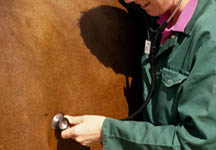Horse owners are being advised not to panic over the news that swamp fever (equine infectious anaemia or EIA) has been found in Britain.
Defra last night confirmed that two horses have been humanely destroyed after testing positive to swamp fever — or EIA — and that the premises on which they were being kept, in Wiltshire, have been isolated.
British Horse Society (BHS) head of welfare Lee Hackett said last night: “Obviously any outbreak of an exotic disease is very worrying and this is news that we did not want to hear.
“But there is no reason to panic and every reason to hope that these cases are an isolated incident and be successfully contained.”
He said Defra has acted “incredibly quickly” and taken every possible precaution to ensure the outbreak of swamp fever is suppressed.
British Horseracing Authority (BHA) director of welfare Tim Morris said no one must be complacent, but offered further reassurance to both the horse-owning public, and the horseracing industry.
“Defra does not think the risk of spread is high or that racing will be affected,” said Mr Morris. “EIA is spread by biting flies and such spread is unlikely at this time of year and with the current weather.”
The EIA was picked up after routine post-import testing of horses from Romania and Belgium. They arrived in the UK on 22 December.
The horses are not competition or racehorses, or breeding animals — and Romania is one of the largest exporters of horses for slaughter in Europe.
Horse & Hound has asked Defra why the Romania horses were in Wiltshire — and we will keep readers regularly updated as things progress.
EIA is often fatal to horses. If the affected animal recovers it remains a lifelong carrier of the disease and will thereby be infectious to other animals, therefore all infected animals must be humanely destroyed to control the spread of disease.
Read more about swamp fever
• H&H will provide updates as soon as we receive them and are in constant communication with Defra and other horse industry officials.




